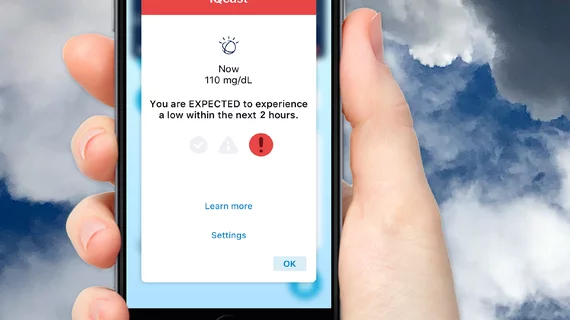App uses AI to forecast hypoglycemic events in diabetics
A new feature for a personal diabetes management application leverages artificial intelligence (AI) to predict the likelihood of a user experiencing a hypoglycemic event in the next one to four hours.
The feature, called IQcast, was announced Jan. 3 as part of a joint collaboration between Medtronic and IBM Watson Health, which provided the AI technology. It is now available for use within the Sugar.IQ app—which works in conjunction with Medtronic’s Guardian Connect continuous glucose monitor—for iOS-based mobile devices in the U.S.
"Simply put, IQcast acts like a weather forecast for people with diabetes so they can better prepare for their day," Robert Vigersky, MD, senior director of medical and clinical affairs for the Diabetes Group at Medtronic, said in a press release. "By predicting the likelihood of a low glucose event from anywhere between 1 and 4 hours in advance, IQcast empowers people on multiple daily injections with insights so they can live their life with greater freedom and better health."
According to the release, the predictive accuracy of the feature increases as a low glucose event becomes more imminent. The Guardian Connect system already offered customized predictive alerts up to 60 minutes before a hyperglycemic event.
Based on data presented at the 2017 and 2018 American Diabetes Association scientific sessions, users of both the smart continuous glucose monitoring system and the Sugar.IQ app spent an extra 36 minutes per day in a healthy blood sugar range of 70 to 180 mg/dL. They spent an average of 30 minutes less in hyperglycemia and six minutes less in hypoglycemia.
"Hypoglycemia, or 'going low', is one of the most acute and frightening events that a person living with diabetes can experience," said Lisa Latts, MD, deputy chief health officer of IBM Watson Health. "Fueled by the right data, AI and machine learning can play a powerful role in helping to alleviate the burden of diabetes and the worry of a hypoglycemic event, and we've built the new IQcast features with this goal in mind."

